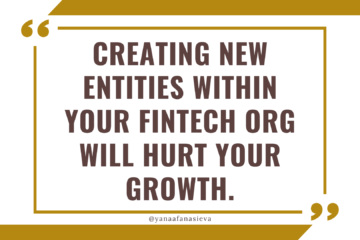Is There a Perfect FinTech Country These Days?
This question comes up again and again. Somehow, people feel that there must be this promised golden-plated land where regulators are amicable, services are affordable, everyone speaks and works in English, there is no bureaucracy, and licenses are granted next week with no questions asked.
Yes, each country has its pros and cons, and it’s always great to operate in a country where there is a business ecosystem, and people understand your business model and are familiar with your technology.
However, trying to search for the perfect, the best, the most suitable jurisdiction and expecting that you would not face any challenges and delays there is a BROKEN STRATEGY.
Instead, it makes more sense to assess the relativity of various factors and whether those factors are lasting or can disappear overnight.
Here are some thoughts on this 💭
Lasting factors:
- Several serious, profitably growing, fairly mature startups from your field (or even some multinational industry leaders) continuously operate from this country, keep their head office there, and don’t jump all over Europe searching for alternative jurisdictions.
- Founders who operated in that country before decided to launch their next startup in the same country.
- It is known and verifiable that it is possible to secure banking relationships and corporate partnerships for FinTech startups in this country.
- A national regulator is not known to take “publicity stances”, issue PR-driven warnings or bans, or start prosecutions and litigations against various industry players, asset categories, or types of activities. National regulator understands that financial systems are inter-connected and global and that not everybody who operates outside of their country is inferior.
Non-lasting factors:
- The regulator has granted an exception or special permission to your competitors.
- This country has a special licensing regime for crypto businesses (it’s irrelevant in Europe because MICA Regulation is coming).
- This country has a more “lax” simplified due diligence regime (because the next AMLD 6/7/8 can overrule it).
- There are a couple of government officials from this country present at every conference or FinTech event in the region talking about how progressive and welcoming their country is towards FinTech. This is irrelevant because the teams working on the license application reviews and subsequent supervisory reviews of your entities are VERY DIFFERENT from the people who work in FinTech labs or regulatory promotion departments.
- This country has granted 300+ licenses of a certain kind in the last 30 days. This is not economically sustainable or credible, and most likely many of those companies will never become operational or will lose their licenses very quickly.
In summary, new laws come into force, people who work at the regulatory bodies change, and one scandal can kill a lot of opportunities or exceptions. Your ability to stay in your lane, be consistent, continue the regulatory dialog, prepare arguments to support your case are much more important for successful license applications and play a much bigger role compared to those initial “lay of the land” factors that you cannot change anyway.
Do you see now how it starts making sense and can work for you, right?


